#I mean the gerudo?
Text
gerudo link my beloved 😌🙏

Found this finished lineart from 9 months ago that I never colored in and figured. I’m on a roll in terms of artistic productivity, so why not?
(if the art style of the lineart seems a bit different, that’s why. It’s just rlly old)
#“So how gay r u” “yes”#I mean can u blame me when crossdressed link exists#Haven’t done the gerudo yet in totk but apparently this outfit is gone??? I’m heartbroken#Should I work on other stuff I abandoned?#Idk we’ll see#I got a whole bunch so the possibilities are endless as long as I’m motivated#legend of zelda#zelda fanart#zelda totk#the legend of zelda#tloz#tears of the kingdom#breath of the wild#botw#loz botw#botw link#zelda botw#botw fanart#link#loz link#loz fanart#loz totk#loz#gerudo#totk#totk link#Hate the way I did the abs don’t look at them#gerudo link#thorium.art
101 notes
·
View notes
Text

@skyloftian-nutcase @nancyheart11 I once again can’t stop thinking about this
#gotta make him convincing right?#I mean he’s tall and muscular he could actually pass as a vai by Gerudo standards#big boobas#Abel is such a crusty scrunkley man I love him#Dad Squad#Rusl is a little chaotic bean of course he’d come up with idea#Abel is grumbling
239 notes
·
View notes
Text
it is so so SO funny how totk's reveal of the ancient hero leaves us with more questions than it answers
#totk spoilers#i just found out about that part today and like#huh. what. huh#what do you mean this past incarnation of the hero is miraculously a zonai with gerudo hair and jewelry#what does it m e a n. this raises so many more questions than if it were just ganondorf#now we have a ganondorf ass zonai who is also link. huh#+ didnt they mention that rauru and mineru were the last of the zonai ? WHO ARE YOU#fey rambles
301 notes
·
View notes
Text
tbh, and that's just my two cents, I think that when we leave our little corner of ganonfans and try to bring out concerns to the larger Outside World trying to convince other people, it's a little more useful at large to center criticisms of Zelda and its narrative outside of what canon states (so in "doylist terms", tho I don't really like that separation but it might be easier to understand), because most of the content that criticizes Hyrule within the games is subtextual and neutered at best (not something meant to be picked up by their core audience of "children who do not come from an oppressed background"), and also because it would be soooo super easy for Nintendo to say "no we never meant any of that in any way :>", which would effectively slam the conversation shut for many people who were skeptical to begin with.
While it's extremely easy to say "no of course Nintendo would never want their good guys to come from a genocidal nation, so they obviously don't", which sounds like a coherent argument, it becomes wayyy harder to brush off the whole "Nintendo chose to repeatedly uphold the exceptional perfection of a white nation whose ruling class comes from a divine birthline while demonizing the only evil men from the explicitely arab-inspired culture, leaving the rest of their women to grovel in eternal apologies and convert to the dominant religion in order to prove the depth of their remorse" without starting to spew out bullshit arguments that fall apart at the first brush of scrutiny or reveal their own racism in the process.
I'm not saying there *aren't* hyrulean genocidal strikes within the canon itself, because there obviously are, but I'd say that to even begin to be willing to see them, you need first to admit the entire Zelda narrative has concerning priorities when it comes to the framing of the events taking place in its lore, or the need to even touch such topics to begin with, that it has concerning echoes to real life history, and so there is a genuine need to challenge that framing at all.
#thoughts#zelda critical#zelda fandom critical#imperialism#gerudos#ganondorf#I think people who have not done the first step back to take it all in will look at “hyrule is genocidal” and go#“this is game theory bullshit level of edgy darkness for teenagers”#and then never think about it again#I'm not saying the other method will necessarily yield a lot more results#but everybody I ever convinced were convinced by the framing argument *first*#and then connected the dots by themselves generally#again just my two cents vOv#I mean there will always be people going UGH SO YOU'RE JUST A GANONDORF APOLOGIST#which.... yeah there's nothing to be done about that unfortunately vOv
92 notes
·
View notes
Text
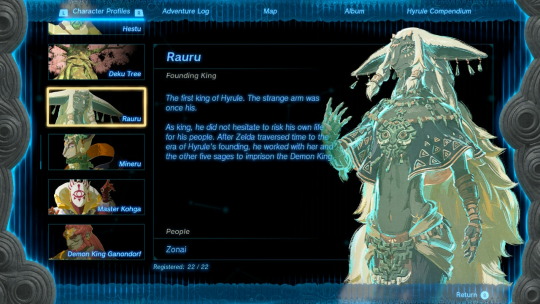


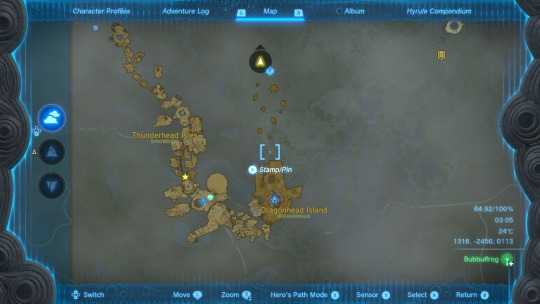
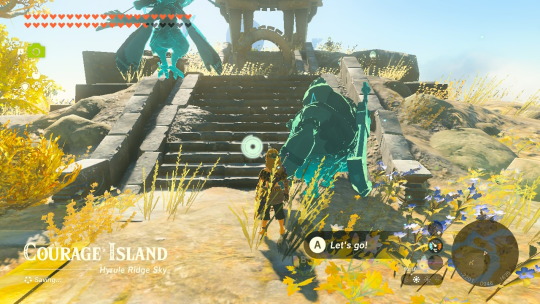
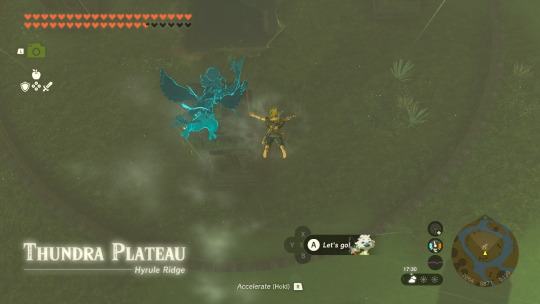
The unspoken importance given to Farosh is driving me insane lol
The Hyrule compendium says Farosh is the “spirit of lightning” and that it “serves the Spring of Courage since ancient times”, it’s body being able to “cause lightning storms”.
Farosh can be found in both the surface and the depths, circling the Faron grasslands and the Gerudo desert.
There is the Dracozu lake, that gives into the spring of Courage and where you can find a piece of the charged outfit, that Rauru wears and that gives lightning powers to its wearer during thunderstorms, being obviously inspired by Farosh and “used in ancient rituals”. Link can also get the two other dragon outfits, but the charged outfit is the only that is given that much importance, through the quest with Tauro.
In the depths, behind the Wellspring of Courage’s waterfall, there is the Dracozu altar (the other two wellsprings don’t have altars), and just above, in the skies, you can find the Dragonhead island, which was hidden by a huge thunderstorm.
Then, there is the courage island, also shaped like a dragon, right above the Thundra plateau, where there is almost always a thunderstorm.
The two other challenge islands are the valor island and the bravery island, still dragon shaped and not wisdom and power themed at all (?).
The Zonai seemed to have their own equivalent of the triforce, kinda, with the imagery of the boar (power), the owl (wisdom), and the dragon (courage), and they seemed to give Farosh/courage/the figure of the dragon a great deal of importance as well (in the Typhlo ruins, the Thundra plateau etc etc).
The Zonai are also very obviously dragon people (most likely inspired by the Kirin, a chimerical creature from Chinese and Japanese mythology), and they’re the bearers of the secret stones, that can transform their wearers into, well, legit dragons.
So a part of me wonders if there is a link between Urbosa and Riju’s lightning powers and Farosh’s… And well, maybe the low-key Gerudo looking Ancient hero (eight heroine?) has something to do with it.
The south-west corner of the map, in the Gerudo desert, is also called the “dragon’s exile”, and right underneath, in the depths, you can find the huge dark skeleton.
#HEED MY WORDS. this will make sense one day#well I mean of course Farosh and the concept of courage are given more importance#Link IS the incarnation of courage just like Zelda and Ganondorf are wisdom and power respectively#and there are obvious parallels between Rauru and Link as well#BUT STILL!!#totk#totk theory#totk spoilers#tears of the kingdom spoilers#tears of the kingdom#the legend of zelda: tears of the kingdom spoilers#the legend of zelda: tears of the kingdom#totk riju#gerudo#farosh#totk rauru#king rauru
328 notes
·
View notes
Text
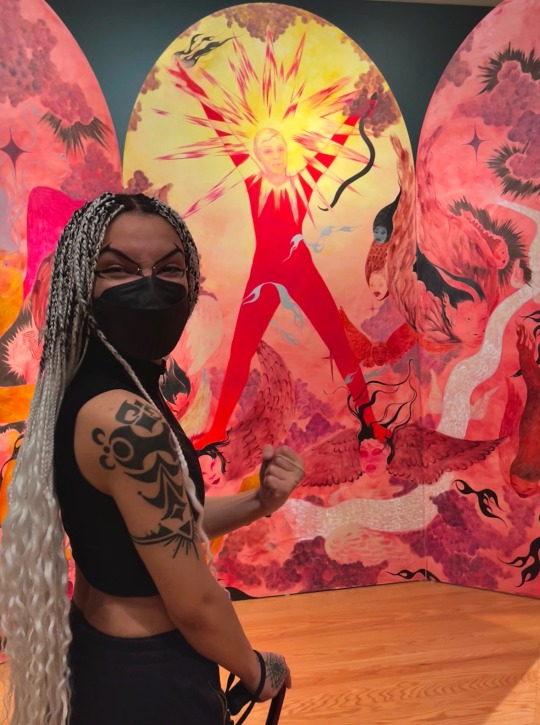


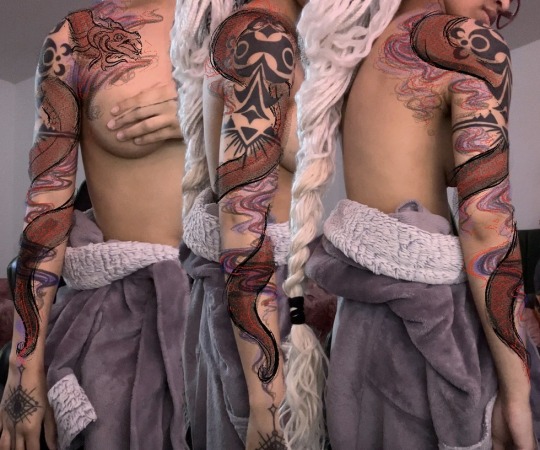
More pictures of my Ganondorf Tattoo in different and better angles! Just finished TOTK, and bawled my eyes out (with a six minute sobbing rant im not sure is cohesive enough to post) but because of it im thinking about a Demon Dragon tattoo to add onto it, perhaps with a marbled gloom style with red and blue, kind of like traditional Japanese clouds with a suminagashi style? There are more concepts to be had while I get through school and artwork!
Ganondorf as a character meant so much to me, since playing ocarina for the first time, becoming obsessed with the first poc (black for little baby me) character I got to see in fantasy media and desperately needing him to have MORE CHARACTER, to the amazing interpretations of the Zelda fans that got me to where I was in art today. His character means so much to me because of the world it introduced me to. Yay!
#my art#tattoo#ganondorf#ganondorf tattoo#Zelda tattoo#tears of the kingdom#totk ganondorf#totk#ganondorf dragmire#tale of two rulers shoutout#growing up Gerudo shout out#I love you guys I really mean it
51 notes
·
View notes
Text
Inevitable Gerudo Headcanon Posting
i spend too much time thinking about the gerudo like genuinely theyre one of my favorite recurring tribes in the zelda series, which as we all know is a form of suffering because god forbid nintendo stop relying on racist tropes and caricatures.
keeping in line with this nintendos portrayal of the gerudo tends to either be 1) why theyre bad, and/or 2) how a culture of all women has kids. like thats an oversimplification of ALLL the problems present in the gerudos portrayal but thats a different post for another time. in general i bring this up because it means, for me as well as any others interested and invested un the gerudo, that there is a kind of generalized lack of pre botw characterization or cultural concepts to work with, esp when compared to the other tribes of hyrule. (looks pointedly at how theres no gerudo in the gerudo desert but there is a prison slash execution site where their king was held. LOOKS AT WHO SURVIVED THE PROLOGUE CUTSCENE IN WINDWAKER)
ANYWAYS. botw was really fun because, while it had plenty of its own issues with the gerudo, they were at least non hostile! so with that in mind, the headcanons and worldbuilding i write primarily apply to the wilds era gerudo, which spans the timeframe between ganondorfs reign as king to totk (suspending disbelief because that timeframe is. by all accounts. longer than recorded human history. friendly reminder ganondorf does All That before we even get sheikah wifi towers. christ.)
anyways. second verse same as the first, core assumptions and then a readmore
Some core assumptions:
The BotW branch of the timeline is chronologically set AFTER the previous timeline, ie the events of ToTKs ancient past is set AFTER the last event of the Hyrule Historia timeline. essentially they all come back together to form one line that makes up ToTKs ancient era
The biggest effect on Hyrules topography was the flooding in Wind Waker. after an unknown point, the flooding ocean receded leaving behind the ruins of ancient Hyrule. at some point after that, the zonai settled parts of it and made the buildings wed see as ruins by the time of BotW. slowly the various tribes of hyrule immigrated back
all peoples within the setting of hyrule are loosely grouped into categories called tribes. in this sense, tribe refers a collection of peoples with shared traits, without anything concretely set in stone (for example, hyrule includes the tribe of hylians, the tribe of gorons, the tribe of koroks, etc etc). the main six who show up repeatedly can be considered the sage tribes (gerudo, hylian, sheikah, rito, goron, zora), and the various types of enemies can be considered the monster tribes (the blin tribe of bokoblin, moblin, bulblin, etc)
so. starting at the beginning. near entirely headcanons
in ocarina of time, we see the spirit temple, where Nabooru awakens as a sage. this temple features a MASSIVE statue of a woman adorned with a snake and its primary mechanic centers around mirrors and reflected light. while the mirrors return, we dont really get that same kind of implied spiritual/religious focus again. so instead im going to make a mountain out of a molehill and position her as the primary spiritual figure here. im running low on name ideas tho so suggestions are much appreciated. for right now ill refer to her as the serpent goddess
the gerudo are culturally a people of function over form, practicality over whimsy, but when circumstances allow for it, are drawn like any other to arts and music and decoration. they have a long history of bloody, brutal battle, and while the war has long since ended, its kings buried and its warriors naught but ghosts, the desert remembers. its sands haunted by the bloodstains of conflict past, and echoes of ancient tragedies. the gerudo here in the era of wilds may have lost their records of their ancient history of conflict, but some aspects, preserved by the sands, have managed to survive the onslaught of time
surviving all this time is the ancient creation myth of the gerudo people. as legend tells it, long ago in the time before myth, there existed a goddess whos power was transformation. she was possessed of two forms, one a proud humanoid figure, the other a striking serpentine form twisting through the heavens with ease, her scales glittering with mirror sheen. to shift from serpent to human, she would shed her skin, and grow it back again to embrace her serpentine form anew
seven times she shed her skin, and from these shed skins rose the first gerudo, each embodying a key aspect of their sacred mother. the serpent goddess's scales are each a nascent soul of a gerudo, and when those scales are shed and fall to the land below, a new gerudo is born. likewise, when a gerudo dies, their soul returns to the scales of the serpent goddess, to await until they would descend again and reincarnate once more. the seven daughters of the serpent goddess led these gerudo as their guardians, leaders, and protectors. but, away from the seven heroines and their new people, the goddess shed her skin an eighth time. this daughter was born alone, and while her sisters embodies the strengths of spirit, flight, endurance, knowledge, motion, skill, and gentleness, the eighth was born with insatiable wanderlust. learning of this, the seven sisters cursed her name for leaving them and their people behind, and despite their shared ancestry, the eighth was forbidden to be spoken of. this suited her just fine, and the eighth was free to walk the land and learn all of its hidden paths
in time, war came to the gerudo, as it often does. though they were united, and strong, they were a small collection of people, and thus despite their proficiency were threatened nonetheless. it became clear at last that they could not stand and fight, and that to survive, they could not remain in place for long. but the enemy had pushed them deep into their home, and knew all the paths back. as hope seemed lost, as if summoned by call, the eighth sister at last wandered home. calling her seven sisters to her, she proclaimed that every hidden step was known to her, and while she lacked the power to guide them on her own, together they would escape unseen into the night, their enemy none the wiser. thus, skillfully guiding the skills of her sisters, the eighth heroine led the gerudo into safety, and the seven were humbled from their pettiness. seeking to apologize to the sister they had banished and forgotten, the seven sought to make amends, but the eighth was content merely to have a place of remembrance among them. to wander is not a sin, as long as one remembers where their home lies.
the eight heroines have long since passed and returned to their mothers scales, but the virtues they embody are cherished by the gerudo family they left behind, seeking to hold their memory close even as the years wear on
to the gerudo was bestowed the blessing of the element of Spirit, embodied by their iron wills and manifesting as crackling lightning. this spirit lightning is the gerudo's will made tangible, arcing out towards their target as an extension of their focus and sheer determination. to a gerudo, nothing is impossible until one has devoted themselves entirely to it, giving it their all, and only then may it be conceded
a long history of persecution has resulted in the gerudo being increasingly insular and isolationist. their admiration of the art of combat and how it can bring forth an individuals talents, achieving a perfect harmony between body and will as the weapon became an extension of ones limbs, was often perceived as aggression by outsiders, who would react as if to defend their own interests. the gerudo have suffered much at the hands of hyrule at large, and have pulled further and further away.
as the gerudo pulled away from hyrule, and hyrule from them, they devoted most of their attention to themselves. cooperation amongst themselves is seen as paramount to their survival, and familial affection often extends well past ones blood relations.
the gerudo value family, and loyalty, alongside independence and cooperation. everyone should have the opportunity to pursue their goals, but if someone is struggling, it is the responsibility of everyone to help. children are raised by as many people as are available, and even in the times of monarchy, the palace was less a formal dwelling place belonging to the gerudo ruler and more a public forum that the ruler simply happened to live in
most of the palaces amenities are fully public, a tradition that has carried on to riju's time. meals are communal and the kitchens open to all, and the palace has no strictly dedicated servants, merely a collection of amenities the gerudo people are free to use at will and often do so together. what this means is that there is no servant, for example, dedicated to preparing riju's meals but instead a collection of people willing to cook and willing to eat making meals riju partakes in, and this applies to most other menial tasks as well. the throne room is where the leader of the gerudo engages in their job as public servant, attending to the needs of the gerudo at large and responding to crises as they arise.
as nintendo is keen to point out, the gerudo are a people that are predominantly "all women", and thus spends plenty of time going over dialogue wherein people wonder how they have children and including a plethora of sidequests in the wilds era about acquiring partners. im ignoring all of that and instead going by lizard rules, in part because here theyre descended from a serpent dragon goddess, wherein a population of all female lizards were able to successfully maintain a stable population and have children without major issue. gerudo like ganondorf are the equivalent of a rare genetic mutation that flips some other genes on and has a different result, that really doesnt affect anything besides this one kid and doesnt have any major effects or differences in their life. two gerudo are perfectly capable of having kids together, having relationships as usual, and on the topic of "how do the gerudo have kids", thats all i really feel like exploring that topic
with an insular, isolationist culture that appeared for all intents and purposes to be all women, the gerudo were often a source of major culture shock when interacting with the other tribes of hyrule, most notably hylians
bonus hylian lore: hylians experience an even greater lack of sexual dimorphism than irl humans do, so gender presentation is near exclusively presentation based, with a heavy emphasis on clothing. showing skin is considered an act of emotional intimacy, and most hylians opt to cover as much as they can. the intensity of presentation scales upwards with their role in society, with the royal family having the most extreme form of gender presentation. gender is presented through clothing style and hair length, with ornamentation, jewelry, and piercings serving as a kind of intensifier, and hylian culture at large tends to operate on a sliding scale of masculine to feminine, with the middle androgynous zone being a weird gender spot for them
the gerudo, by contrast, never really developed a concept of masculinity versus femininity. gender pronouns in gerudo are based on personal proximity, occupation in society, and familiarity. these barely translate at all into hyrulean.
as the gerudo, by circumstance or by choice, interacted with hylians and the tribes of hyrule more and more often, some kind of understanding had to be reached with regards to translation. as relations were already terse, making an attempt to fully translate the gerudos understanding of gender to your average hylian was considered a fools errand, and thus translation was done in broad strokes, giving hylians the simplest root form of gender pronouns (and none of the increasingly specific declensions). loosely, the term vai is closer in concept to "us" and voe is closer to "not us" "foreigner" "outsider", and has taken on a connotation of " forbidden" or "taboo" (leading to wilds era gerudo secret clubs often imploying translatable Adult Puns regarding their catering to voe and the overall titillating atmosphere they tend to put on for customers). with regards to hylians, the feminine princesses and queens had more in common with the gerudo and were thus "vai", but the masculine kings and soldiers, who were often the main figures pushing aggressive efforts into conquering or otherwise absorbing the gerudo into hyrule, were "voe". this was then distributed in various guides to understanding the gerudo language as " vai" meaning "woman" and "voe" meaning man
gerudo town, as the capital of their people and general hub, has a law banning the entrance of voe. at the time if its writing, this was a fairly obvious law, because most "people who are forbidden" are forbidden from entering. as time has passed, hostilities cooled, and relations warmed, this law has been the subject of a long struggle of interpretation. it doesnt translate well into nearly any other language, and thus who counts as "voe" and "vai" is subject to endless debate. the differences in gender perception are most clearly on display with the admittance of the gorons. one might assume that the gorons, being a monogendered people who typically use masculine terms of identity and endearment in hyrulean, to thus qualify as voe, but the gorons cooperative nature, near uniform monogendered culture, and emphasis on hard work and independence has enough in common with your average gerudo that considering them as vai is a no brainer
ganondorf thus is also, clearly, considered vai. the specific pronouns he uses in his native gerudo include declensions regarding his position as royalty (one that has since gone out of use and is fairly archaic now, only really being used as a kind of neo-pronoun by current era gerudo as a rebellious self identification thing), his relation as the only child of koume and kotake, and are conjugated based on relation between the speaker and him. in the ancient era, calling ganondorf voe would be so confusing as to not even read as an insult. if one really wanted to refer to ganondorf with a tone of insult, theyd substitute the declension of familiarity with one used for strangers
ganondorf achieved his position as king the old fashioned way: a gift from his moms. ancient era gerudo practiced typical monarchy with a line of succession, and koume and kotake named him as the next royal of the gerudo as their heir. the hyruleans, seeing a masculine gerudo of royal birth, referred to him as "king", and correcting a culture of people he had little respect for was just a waste of ganondorfs time. after ganondorfs sealing, the gerudo changed to the current system of chiefs, wherein the current chief names a successor, or by default passes it onto their living heir. a system is in place to democratically install a new chief if the current one passes without naming a child their heir, or naming a successor in their place, a system drafted and then used in ganondorfs absence. riju thus inherited the mantle from her mother, but could opt instead to force a vote, or have such a vote forced on her due to her age, leading to much of her insecurity seen in BotW. this system has proven to be relatively stable, especially coupled with the continued tradition of keeping the palace an open public forum
the first chief of the gerudo was nabooru, advised by the sage of lightning we see in totk, following ganondorfs sealing
the gerudo are very familiar with the souls of the dead. poes, souls lost and aimless, wander the desert after millennia of bloodshed. thus their funerary customs have persisted, even as the folklore behind them fades in and out of memory.
a person perceives reality through their body. they know the sky is above them both by craning their neck up, and by the sensation of ground beneath them. in death, one is bodiless, and sensation becomes a confusing, directionless onslaught. it is so easy for a spirit to become lost, unable to orient themselves. the gerudos funerary rites seeks to aid these souls in their journey towards returning to the serpent goddess, as without guidance they are liable to become poes. the body after death is merely an empty receptacle, and on a practical level is a potential draw for dangerous desert scavengers seeking an easy meal. the shifting sands and hard soil makes burial difficult to impossible, so instead the gerudo burn their dead. smoke is ephemeral and thus able to be seen by spirits, and even as the wind rushes, smoke will still travel upwards towards the heavens. a spirit will linger by its body for a time, and thus cremation helps provide guidance to the dead. unable to feel the earth beneath them, the dead can follow the trails of smoke to orient themselves upwards, and dispel lingering confusion
as the body is burned both to guide the departed's soul and to ward away scavengers, the gerudo inter their belongings into gravesites instead, usually one or a small collection of items that the deceased valued or were considered emblematic of them. having a proud history of warriors, many gerudo consider their weapons extensions of themselves, and thus many gravesites will consist of a single weapon.
the sage of lightnings temple served as the primary gravesite for many gerudo, and in its heyday was decorated with love and care as befitting its role. torches burned bright in its sconces and the walls painted with care in massive sweeping murals. here in the temple, a foreigners idea of the gerudo as austere and practical would fall away, as the halls shone with warmth and color, taken from their desert home
lost souls that become poes often end up becoming consumed by their regrets and despair at their inability to find their way back to reincarnation through the serpent goddess's scales, and from there turn to rage and aggression. the sunlight glinting off of the goddess's mirror scales will blind and disorient the dead who have lost their way, as they try in vain to rely on their half forgotten senses, and thus poes eschew the day in favor of the cover of night. though incorporeal, poes move as fast as the desert winds, and try all they can to cause mischief and havoc. usually the end result of their shenanigans is light injuries and scratches, but it isn't uncommon for a waylaid traveller or adrenaline seeking youngster to suffer fatal consequences. despite this, poe hunting tends to be the go-to act of rebellion for antsy teenagers with a taste for danger. in general, one of the only things fast enough to strike a poe is a fired arrow
as the sands grew and the desert expanded, it grew more and more difficult for the steeds of the gerudo to gallop across the dunes, and they were driven further and further back until the gerudo phased out their horseback traditions entirely
and as an AU specific trivia tidbit
after ganondorf's sealing, nabooru grieved the loss of her childhood friend by constructing a dedicated tomb to house ganondorf's gravesite. even though he wouldn't die, nabooru would never live to see him again, and in traditional gerudo fashion, his gravesite is marked by his signature trident, further imbued by nabooru's blessing of lighting (in a similar fashion to urbosa's fury, despite urbosa not being a sage).
#totk headcanons#totk spoilers#loz gerudo#gerudo#ganondorf#totk au#loz headcanons#i THINK thats all the relevant ones#god i hope the readmore works. guess ill find out#BUT ALSO. GANONDORF NEOPRONOUNS REAL IN MY HEART. HES VAI. HES AN INCREDIBLY NICHE AND ARCHAIC FORM OF VAI#THAT HIGHKEY ISNT EVEN RELEVANT ANYMORE. biographies about him confuse+anger gerudo scholars because translating his pronouns is a BITCH#it also makes riju removing the voe restriction more impactful imo because its a symbol of how far the gerudo have come-#-in their relations to hyrule. because the voe rule is almost entirely like. a no hyrule thing snfnsndhdbf#so hyrule finally like! not being so much of a threat that the gerudo feel they have to stay closed off! going from oppressor to ally!#LET IT MEAN SOMETHING NINTENDO G O D#anyways. ganondorfs so gender.#nvm got the readmore to work c:#loz totk
72 notes
·
View notes
Text
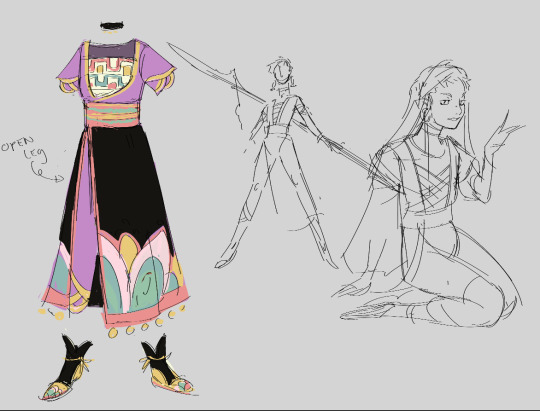
scribbling out an idea for an outfit during my morning meetings~
#taking a swing at redesigning some of the gerudo clothing#pink and purple zelda this time around b/c i lean so hard on blue#also looking a bit too hard at Ganon's sash so u kno#i think gerudo city is also sort of this#refuge for those who need safety from monsters and from the zonai#so Zelda mysteriously appearing near their city walls means the only reasonable thing to do would be to take her in and make sure she's oka#i also just needed to get her out of the zonai priestess dress and into something functional and breathable so this is my explanation#not certain on the colour tho but maybe?#love black with pops of colour#great look#my doodles
129 notes
·
View notes
Text
I know nothing about Mr Ancient Hero but he is blorbo coded

like dude, what even ARE you?
#blah blah blah#totk#totk spoilers#like obviously he has zonai clothing#as far as I can tell zonai don't have tails#but I could be wrong#and the green skin + red hair is very Ganondorf#just like the tapestry of the calamity 10000 years before botw#that's why so many people had the theory that the hero was a gerudo man#but no aparently hes a zonai(?)#since zelda is definetly part zonai it's safe to assume that there are more people that are decended from the zonai#so maybe our Ancient Tapesty Hero here is decended from the zonai and gerudo??#which would be super cool#cuz that would mean that the legendary hero could be born as something other than Hylian/human#I hope we learn about him in the dlc#I am DESPERATE to know more about him hgfshdfgsdh
57 notes
·
View notes
Text
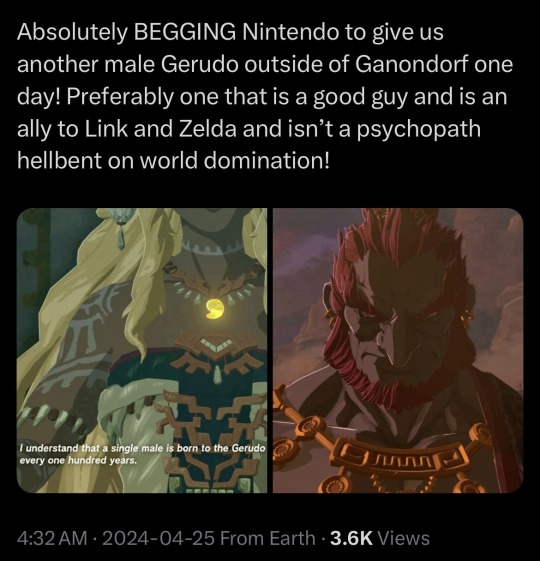
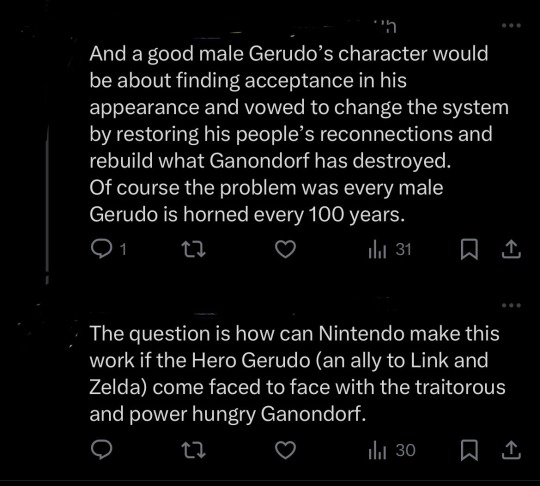
I think Ganondorf should not only remain the only Gerudo man ever but also double down on his antagonism against Hyrule actually 😊
#I don’t mean that actually I think gan would benefit from a fellow gerudo male homie for his own sake#that being said these takes tend to bend me the wrong way#he’s good if he submits 😔#how boring#ganonthots
14 notes
·
View notes
Note
I mean… you can’t really get around how orientalist the design of the Gerudo set is either. Like you’d have to redesign it as well.
yknow in the nicest way possible every time i point out how transphobic the gerudo quest is i get a bunch of asks like this. which like. yes. you are correct. it is racist. i am not denying that it is racist. i am painfully aware of the fact that it is racist. i would absolutely try to fix that if it was within my power to do so. however that was not the specific issue i was addressing in the last post, thus i did not bring it up. i am, as a trans person, equipped to address the transphobia off the top of my head in a way that i am NOT, as a white person, equipped to address the orientalism. one of those things is something i have experience with and one is not necessarily my place to redesign or fix. so.
#if you want gerudo redesigns i guarentee there are a ton of african/SW asian fans who have the cultural experience and knowledge to do so#and are much more able to accurately represent their own cultures than i am.#sorry if this is mean or you didnt mean it that way but the last time i talked about this i got a ton of asks like this that kind of#insinuated i was ignoring the racism?? and it pissed me off. we are having a different convo rn. there can be more than one problem#asks
74 notes
·
View notes
Photo








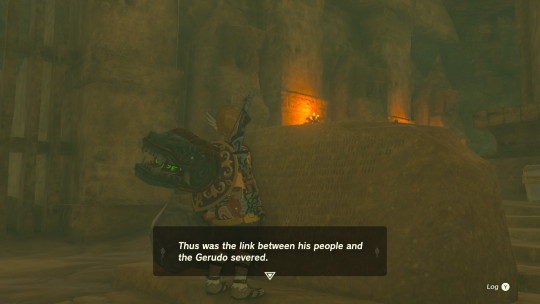

....is it just me, or does the conclusion of this side quest imply that a past incarnation of Link was the Eighth Heroine??
#legend of zelda#tears of the kingdom#totk spoilers#tears of the kingdom spoilers#I MEAN#the event the memorial describes parallels how you save Gerudo Town in the current time#it's gotta be a previous Link right?
47 notes
·
View notes
Text
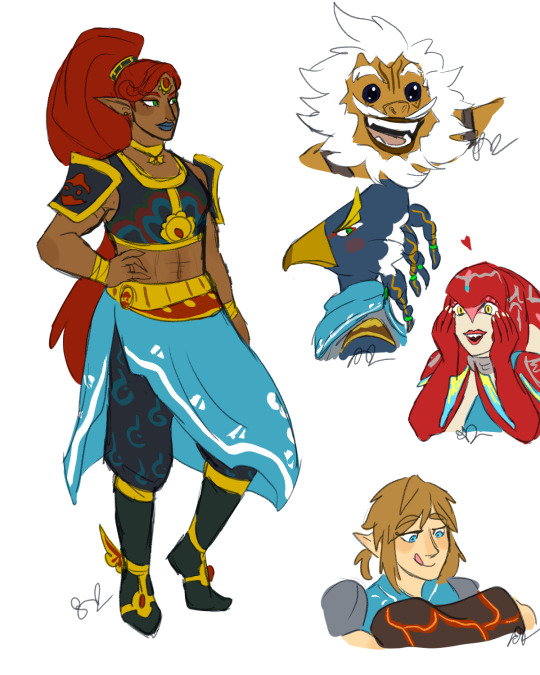

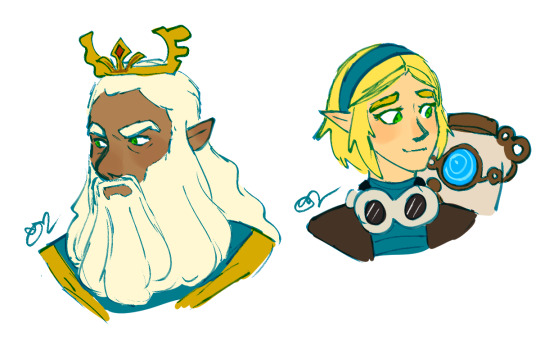
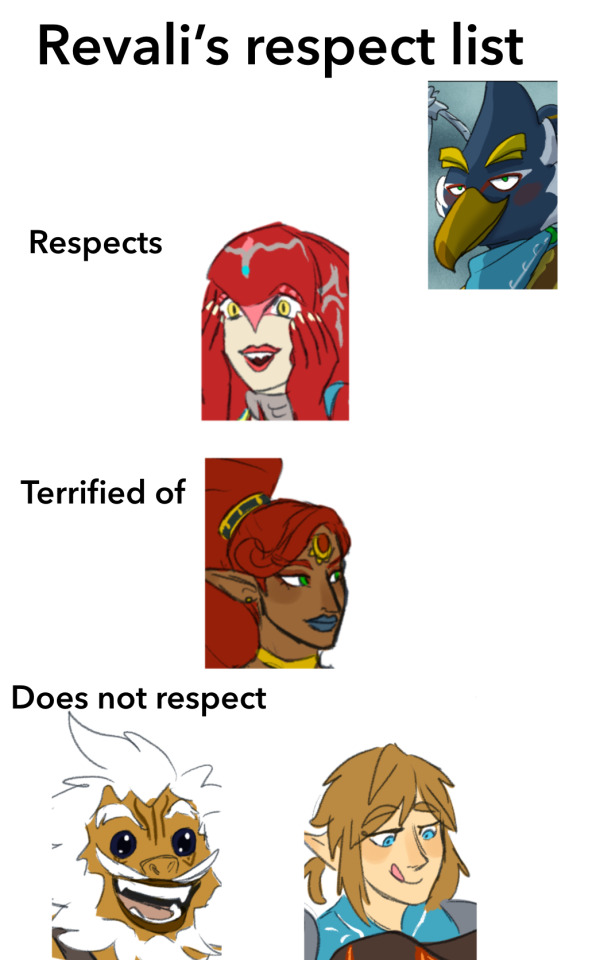
Team B do kotg plus the Royal family. Idk how I feel about Urbosa’s design, truthfully I didn’t put a lot of thought into it, all I know is that I reallly wanted to give her boots because the idea of the Gerudo running and fighting in the sand in HEELS hurts my ankles. Like OW?? But idk I don’t like her pants. It’s not a final design anyways… I’m excited to explore the champion’s dynamic more. They’re so fun. I also wanted to give Rhoam very light blonde hair instead of white cuz I hate how he looks like he could be old enough to be Zelda’s grandfather 😭😭
#revali will shamelessly make fun of Link and Daruk#he of course loves them but he also is annoyed by them#as one does#daruk and urbosa are the parents to the three children#legendofzelda#legend of zelda au#zelda au#king of the gerudo#age of calamity#I didn’t mean to give Daruk big fangs I just#I like fangs …#also I feel like link doesn’t like dogs#he’s not a dog person#nor an animal person for that matter#which is funny considering the fish… and birds…
183 notes
·
View notes
Note
I’m thinking thots at work, what do we think Wild’s [Name] would be like? -🧚🏽♀️
i feel like she'd be the leash that stops him from literally killing himself with whatever dumbshit that comes to mind and wild's the puppy that finds something (in this case, [name]) and refuses to leave it?
maybe she's someone who works at the castle who survived the calamity and was put into something like the chamber of resurrection in hopes they'd find each other and she'd keep him from doing more dumb shit because someone realized "hey, [name] and zelda are the only ones link listens to. they're literally his impulse control. but zelda's not here and [name]'s not immortal, so we should probably put her in like, a cryo-chamber or something" and then handed her off to the sheikah and said "do something please"
or she's some sort of mysterious figure who always appears out of nowhere (and gets to places you'd least expect to find them in) and isn't there when you turn around to look at them? like, maybe she showed up on the great plateau when wild first woke up, was questioned by the king as to how she got there, she just hits him with a "don't worry 'bout it sweetheart," and sticks with wild until he's ready before literally disappearing once he lands on the ground outside the great plateau? then at some point, he finds her again, asks where she's been, and he gets hit with "i was out having fun and getting what i needed to be done," before sticking with him for a few more days and ultimately disappearing again
imagine if she just showed up in the lost woods while he was about to get the master sword and absolutely scared him with "you'll probably want to get more health for that. it'll knock a lot out of you." "how do you know?" "just know that i know and be thankful that i told you," before going off to trade with some koroks and disappearing??
or what if she's a good friend of link's (or lover. idk) that died over the course of the hundred years he's been asleep? she's a ghost like the king, but because she doesn't have to guide him and help him relearn things (the king took that upon himself), she's just there to keep him company? because either zelda or the gerudo (keeping the geurdo to my heart no matter what 🤞🏽) managed to turn her into a spirit/ghost that's not exactly similar to the champions in the sense she isn't stuck to one spot/person and has her own separate set of rules? maybe she's not able to be seen by anyone else except wild so he has to do this, that, and the third to not look insane when she's talking to him in front of people? then, when everything's said and done, she doesn't disappear like the champions or the king because she's was created by the gerudo/zelda?-- or, if zelda made her, she's significantly weaker than 100 years before (and grows weaker the longer wild takes to beat ganon) since zelda's grown weaker as well, but as time passes post-ganon's defeat, she grows stronger?
#faeries in the garden#the palace answers#im sorry my hyperfixation on dead people kicked in#if i warm up enough maybe ill draw the [name]s idk#had to bite back the urge to make mysterious [name] say ''worry about what zelda's gonna do with your coffin once she gets out''#''i see that you're not doing what you need to be doing. instead you're out here.. torturing this korok like you're some woodsman and it's +#+ a tree. mh mh mh. anyways''#and then she disappears again??#mean [name]s are literally my favs#off topic but why are none of my loz ocs hylians 😭#my one hylian oc doesnt even like being hylian 🗿#i just got beef with hylians for some reason#i got beef with the kings name to#you could not pay me to spell ts out#behind the gerudo and ghost [name] thing; i see the gerudo as being really good with anything that's related to the deceased/dying as well +#+ as witchcraft because of twinrova/koume and kotake#but since botw/totk are basically disconnected from the rest of loz idk#Athena. Songbird. Atalanta. and Aphrodite
45 notes
·
View notes
Text

behold: my second least favorite string of words in the entirety of Tears of the Kingdom.
(it's a little less transparent why this time so I'll explain my thoughts under the cut)
So why do I not like this?
In so many words: because if you remove it, the scene still works, but you lose the moral certainty of what is going on.
This single sentence does so much legwork for the entire game (the kind I dislike), to the point where I'm about 60% sure it's the product of a rework that realized how ambiguous Rauru's position was as the Good Rightful King and needed to nervously reassure the players that Ganondorf Is and Always Was the Invader, Actually.
(no matter that it leaves the gerudos in this awkward in-between state of both invaders and victims, while never dwelling in the specifics of their history and their own agency in the entire thing; brushed off as a sin they have to expiate through loyalty to the winners of that particular strife, but without explicitely blaming them either to avoid the implications of what that would have looked like)
If you remove it, not only do you lose a pretty clunky line that detracts from Ganondorf's intimidating presence (who is he even speaking to? who needs to hear this right now?) that honestly speaks for itself when it comes to his experience with warfare, but also you lose any tension and any mystery regarding why he is attacking in the first place.
You also... kind of rob Ganondorf's motivations of their meaning. "Hyrule will bow down before me" leads to asking... why? What does he want? What does he see in those lands? And what little we get with Rauru and then Link during the final fight begs more questions; why do you prefer hardship to peace? Why do you value strength? What leads you to want to rule a land devoid of survivors, become a king without a kingdom? I don't think we ever get satisfactory answers. If you remove this sentence, on the other hand... Subtextually, it becomes pretty clear that his motivations is that he felt threatened by Rauru's power, which is ripe with subtext and questions about whether this is a legitimate reaction, whether his "no survivor" stance is due to a feeling of betrayal when his own people turned against him post the Demon King shenanigans... I'm not saying it would fix the entire game's writing, far from it, but it would already do *so much more*.
(genuinely, I think he could have stayed completely silent during the Molduga Assault, speaking only in the Show of Fealty before going completely nuts after Sonia's murder, and it would have worked MUCH better in terms of characterization but anyway anyway
EDIT: ALSO!!! that way he wouldn't speak hylian to fellow gerudos, which is weird inherently)
Without this line, the core of the tension between the gerudos and Hyrule comes front in his conversation with Rauru; it allows the cause of his hostility to be Rauru's invitations, that he would have taken as a threat, and would have still made him warlike and domineering without making him cartoonishly flat, because, once again, Rauru is not acting in a particularly more legitimate way when Zelda arrives in Ancient Hyrule; and it would have been... fair to point that out. And make for better characterization for Rauru, and Sonia, and Mineru, and everybody. But the priority was for Hyrule to be pictured as unquestionably holy; always legitimate, always truthful, always beautiful, always just.
Also, and this is more of a nitpick but: why would Ganondorf want Hyrule, specifically, to bow down before him also? Was he at war with the rest of the disparate tribes before, and just carried on his ambitions to the very very newly-founded kingdom as they allied under a new banner? (though it seems to be implies the lands were crawling under monsters in a generic sense, and not Ganondorf's attacks in particular) Why would he even consider Hyrule a legitimate entity worth taking over then, if it is so new, born from the will of a powerful rival, founded by what is basically a stranger to these lands? Why would he covet something so young instead of destroying it and just calling the lands Gerudo Lands II or Grooseland or something?
I don't think any of that was even accounted for, because, beyond everything else: to me, this sentence is so clearly and painfully crammed in here to shield Hyrule from any potential blame and immediately characterize Ganondorf as Bad without having to remove any of the causes that could lead one to side-eye Rauru's little pet project as equally questionable.
Beyond the clumsiness, it is cowardly --and, I think, a little damning.
#totk#totk critical#when will my brain return from the imprisoning war...#ganondorf#gerudos#rauru#tl:dr it is cowardly and reveals that nintendo knew about the Implications to some degree#sometimes less is more#really in that case less would have been so much more#it is literally ganondorf's first chronological line#yeah sure it tells you everything about the guy but#it's also such a bold commitment to flatness and self-righteousness that... yeah#and before I hear any “at least Rauru wasn't using force” I mean as far as we know though?#the constructs attack anyone deemed an “invader” on sight one of the things rauru does is to apologize for this#(I reread Rauru's initial dialogue in the Sky Islands and it would have been SO GOOD if any ambiguity would have been allowed)#(like the thing about Constructs mindlessly pursuing their useless tasks forever disquieting him...)#(yeah buddy so true that could uhhh almost be a metaphor for something else regarding purpose and lineage or something wow)#and even if he didn't use force directly the power dynamics and repeated invitations are still undeniably questionnable#like my guy why do you want everybody to kneel down to you what's up with that do we unpack this or#at least ganondorf was like.... born and raised a king (not that it excuses anything but he inherited pre-existing traditions)#so did zelda#she was born in an imperfect system and did whatever she could about it#rauru *crowned himself*#he *made* the system
140 notes
·
View notes
Note
Let say Triforce of Power becomes a cartoon what network would be the best at? Cartoon Network, Nickelodeon, or Disney?
Hmmm... Cartoon Network did Over the Garden Wall, so let's go with that 👍
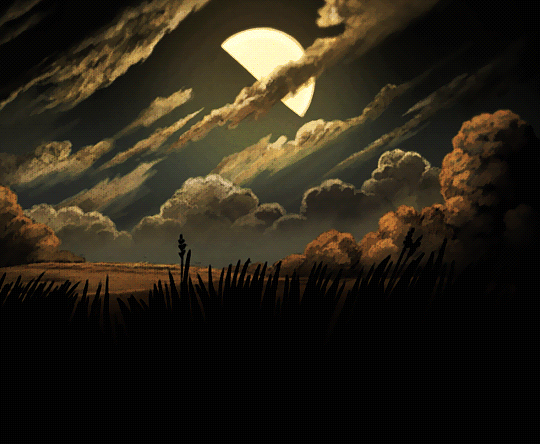
#OtGW is going to be 10 years old this November....#many feelings#also the prospect of this being turned into a musical like Adventure Time or Steven Universe is freaking hilarious to me#but in a good way#having Link a generally mute character burst into song would be amazing#also Gan fancies he has the voice of Arijit Singh#spoiler he doesn't#oooh a musical would mean we could have bollywood style numbers for the Gerudo#okay I low-key want this now
10 notes
·
View notes